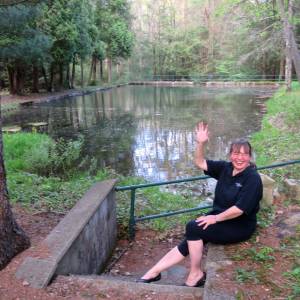Milestone: First Monarch Caterpillar!
"Learn from yesterday, live for today, hope for tomorrow."
~ Albert Einstein
We have a nice big patch of milkweed growing at the front of the hedge in our yard. It's magnificent, really, and as a certified "crazy butterfly lady," I wear that success like a crown. I am thus, through this resource, able to provide generously for our bugs. How so? Let me tell you more.
Numerous insects call that milkweed patch home. All manner of bugs live and snack and recreate there. Flying bugs and crawling bugs. It's practically party town! But here's the one that makes me most excited of all: a monarch butterfly caterpillar!
Monarch caterpillars consume the toxic compounds in milkweed (cardenolides) and weaponize them in their bodies. This makes the monarch caterpillars, and butterflies, poisonous to predators. (If you EAT it and you die, it was poisonous. If it BITES you and you die, it was venomous. You're welcome.)
Anyway, I've been seeing holes in some of the milkweed leaves and I had my suspicions. I mentioned it to my husband, and he turned his laser-like attention to the plants around the holes. Look who he found on this morning: our very first monarch caterpillar! I know it looks huge in this photo but it's actually about a half-inch long.
We have been seeing monarch butterflies all around for the past week or two. I mean, lots of them. Several per day, at least, in our patch. Many more up and down Tow Hill, and the other places I go. What good news.
I have heard of the problems that face the butterflies, but we are doing our part here. We are providing food and habitat and nurseries for the baby CRAWLY things that turn into FLYING things, and take to the skies. We have hope - and help - for the butterflies!
I think this is a fine tune for a Sunday in which we found our first caterpillar of hope. Some people refer to the State College area as Happy Valley. So we're just going to enjoy another Pleasant Valley Sunday, courtesy of the Monkees, and watch our little friend munch up and down the milkweed stalks. What a delightful way to start the day!
Bonus, three simple things you can do to help monarchs:
1. Provide nectar plants (flowers) for butterflies and host plants (milkweed) for caterpillars.
2. Eliminate the use of pesticides in your yard.
3. Encourage those managing public lands NOT to mow the wildflowers, and to plant nectar and host plants in key locations, such as along roadways.

Comments
Sign in or get an account to comment.


